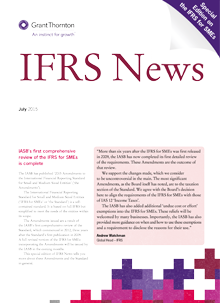The International Financial Reporting Standard for Small and Medium Sized Entities ('IFRS for SMEs') is a self-contained standard. It is based on full IFRS but simplified to meet the needs of the entities within its scope.
The IASB has published '2015 Amendments to the International Financial Reporting Standard for Small and Medium Sized Entities'. These amendments are the outcome of the IASB's first comprehensive review of the requirements of the IFRS for SMEs, and are the only changes made to the Standard since it was initially published in 2009. The amendments that we believe will have the most significant impact are as follows:
- permitting the use of the revaluation method when accounting for property, plant and equipment
- aligning the basis of recognition and measurement for deferred income taxes with IAS 12 'Income Taxes'
- aligning how entities account for exploration and evaluation assets with the requirements of IFRS 6 'Exploration for and Evaluation of Mineral Resources'
This special edition of IFRS News tells you more about the IASB's Amendments and the IFRS for SMEs in general.



